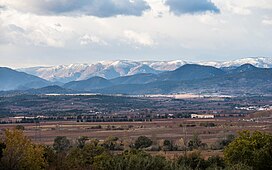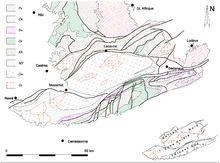
Back Montagne Noire Afrikaans الجبل الاسود (سلسله جبليه فى فرنسا) ARZ Montanha Negra Breton Muntanya Negra Catalan Montagne Noire (kabukiran) CEB Montagne Noire Czech Montagne Noire German Nigra Montaro Esperanto Montaña Negra Spanish Montagne Noire (France) French
| Montagne Noire | |
|---|---|
| Black Mountain | |
 Montagne Noire in the background, covered in snow, partially obscured by hills | |
| Geography | |
| Location | France |

The Montagne Noire (French pronunciation: [mɔ̃taɲ nwaʁ]; Occitan: Montanha Negra, known as the 'Black Mountain' in English[1][2][3]) is a mountain range in central southern France. It is located at the southwestern end of the Massif Central at the juncture of the Tarn, Hérault and Aude departments. Its highest point is the Pic de Nore at 1,210 metres (3,970 ft).
The mountain is within the Haut-Languedoc Regional Nature Park.
The GSSP for the Tournaisian is near the summit of La Serre hill, in the commune of Cabrières, in the Montagne Noire.[4] The GSSP is in a section on the southern side of the hill, in an 80 cm deep trench, about 125 m south of the summit, 2.5 km southwest of the village of Cabrières and 2.5 km north of the hamlet of Fontès.
- ^ Wraxall, Nathaniel William. 1784. A tour through the western, southern, and interior provinces of France. London: Charles Dilly, p. 111.
- ^ Boyer F., S. Krylatov, J. Le Fevre, & D. Stoppel. 1967. "Le Dévonien supérieur et la limite dévono-carbonifère en Montagne Noire. Abstracts of the Proceedings of the International Symposium on the Devonian System, Calgary, Canada, Sept. 6–8, 1967. Calgary: Alberta Society of Petroleum Geologists, p. 26.
- ^ Ford, Ford Madox. 1962. The Bodley Head Ford Madox Ford: The Good Soldier. Selected Memories. Poems. London: Bodley Head, p. 26.
- ^ The GSSP was published by Paproth et al. (1991)
